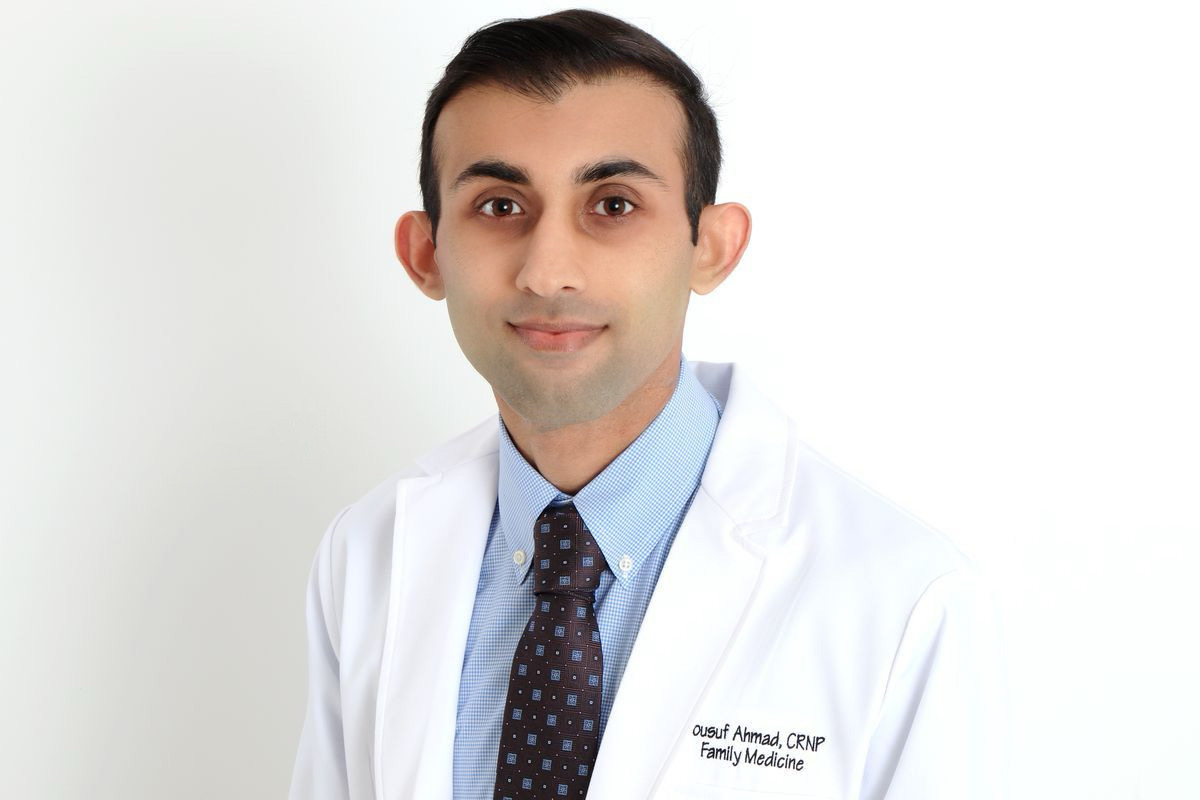For Yousuf Ahmad, MSN, CRNP-F, family nursing is more than a career—it’s where technology meets empathy and innovation drives compassion. A graduate of the George Washington University (GW) School of Nursing, Ahmad brings a unique blend of evidence-based care and digital tools to his work, offering a modern approach to community health that is deeply rooted in holistic patient care. Through GW’s Family Nurse Practitioner (FNP) program and his work with the NP-Tech initiative, an HRSA-funded project led by Professor Christine Pintz, Ph.D., RN, FNP-BC, FAAN, ACC, FAANP, Ahmad has honed his skills to meet the evolving needs of underserved populations. Now practicing at Chesapeake Health Care, Ahmad leverages technology to address health disparities, simplify care access, and improve patient outcomes.
A Transformative Education: GW’s Family Nurse Practitioner Program
Ahmad was initially drawn to GW’s FNP program because of its robust focus on evidence-based practice and holistic care. “The academic excellence and innovation at GW were undeniable,” he reflects. “My experience was transformative, encouraging me to think critically and approach patient care differently.” This training emphasized looking beyond symptoms to see the entire patient—a skill Ahmad considers central to his practice.
Working with GW’s expert faculty and collaborating with peers broadened his understanding of patient care and sharpened his clinical perspective. This environment encouraged critical thinking and adaptability, skills Ahmad uses daily at Chesapeake Health Care, where he meets a wide range of health needs and adapts his approach to serve each patient’s unique circumstances.
Learning the Power of Technology Through NP-Tech
At GW, Ahmad also worked closely with Dr. Pintz on the NP-Tech grant, which aims to improve healthcare access through technology. “Dr. Pintz and the NP-Tech team highlighted the critical role technology plays in enhancing patient care,” he says. “Their interdisciplinary approach to complex health challenges inspired me to see technology as a tool to overcome barriers and streamline processes.” This experience helped Ahmad understand how innovative tools can increase patient engagement and communication efficiency, directly shaping his approach to clinical practice.
In his work, Ahmad integrates telemedicine to reach patients facing transportation challenges or dealing with complex health issues like diabetes and hypertension. This strategy not only increases access to care but also allows for more consistent follow-up, creating a smoother and more accessible care experience for patients who need it most.
Bringing Technology to Life in Everyday Practice
Practicing in an underserved community, Ahmad applies his technology-driven approach to improve care access and quality. Recently, his practice introduced artificial intelligence (AI) software that automates documentation during patient encounters, allowing him to focus fully on the patient. “This tool lets me dedicate more attention to my patients, ensuring they feel heard and that I can address their questions,” he explains. With this tool, Ahmad can provide personalized care and maintain strong patient-provider relationships.
This technology is especially valuable for patients with chronic conditions, as it supports consistent follow-up and allows Ahmad to work closely with them on their health goals. For Ahmad, integrating technology goes beyond efficiency—it’s about building trust and connection to promote better health outcomes.
Embracing Diversity and Empathy in Patient Care
Throughout his FNP training, Ahmad encountered the complexities of treating a diverse patient population. “Navigating different perspectives and health beliefs required me to become more culturally competent and empathetic,” he recalls. These experiences have helped him tailor his approach to each patient’s background, promoting respect and understanding.
This commitment to empathy continues to shape Ahmad’s practice at Chesapeake Health Care. He believes that healthcare providers should view each patient as a unique individual with specific needs and perspectives. "The collaborative spirit I developed at GW is something I carry with me,” he says. “I make it a point to work with an interdisciplinary team to ensure all aspects of my patients' health are considered."
Advice for Future FNPs: Stay Curious and Embrace Innovation
To aspiring FNPs, Ahmad advises maintaining a sense of curiosity. “Be open-minded and embrace the tools and technologies available to you. They can enhance your ability to provide patient-centered care,” he advises. Ahmad also encourages students to collaborate with other healthcare professionals, sharing best practices for integrating technology. "By fostering a culture of innovation and teamwork, you can collectively enhance patient outcomes," he says.
A Heartfelt Thanks to GW School of Nursing
Looking back, Ahmad feels grateful for his GW School of Nursing experience. "The faculty and the NP-Tech program team equipped me with invaluable knowledge and skills,” he shares. “My patients and I are truly grateful for the education I received, which allows me to serve them with both compassion and expertise."
By merging a commitment to evidence-based practice with an openness to technological innovation, Yousuf Ahmad exemplifies the modern family nurse practitioner. His journey is a testament to the transformative power of advanced nursing education, inspiring the next generation of nurse practitioners to make a lasting impact on patient care.


